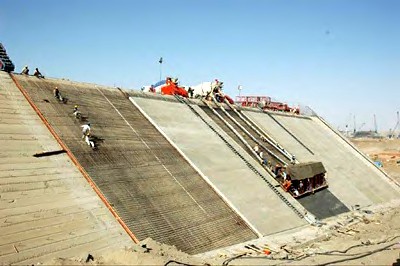
Merowe Dam in Sudan where the largest source for electrical power is being constructed on the African continent., a photo by Pan-African News Wire File Photos on Flickr.
Renaissance Dam hasn’t Won Experts’
Consensus yet Water Experts’ Views Vary over Ethiopia’s Grand Dam
Isam Sulieman, sudanow.info
Though 28 percent of the construction work on the Grand Ethiopian Renaissance Dam (Millennium Dam) has been completed, yet the Dam constitutes a political and economic issue at the domestic and regional levels, and a wide controversial topic over its advantages and disadvantages on the neighboring countries.
Recently the Peace and Development Studies Center of Bahry University, in cooperation with the United Nations Educational, Scientific and Cultural Organization (UNESCO) Chair, organized a symposium titled “The Renaissance Dam: Opportunities and Challenges” at the Knowledge Enlightenment Center in Khartoum where experts, diplomats and lawmen contributed rich and various scientific views on the dam project.
Dr. Suleiman Mohamed Ahmed Suleiman, a world water expert, urged the countries related to the establishment of the dam for cooperation and coordination to enhance the interests and avoid harms as the matter has already become a reality.
He noted that the talk is useless at this phase, saying that “if there was good thinking based on coordination and good offices between the three countries (Sudan, Egypt and Ethiopia), the renaissance dam could have been an alternative for many dams including the High Dam, Meroe, Roseiris and Jabel Awliya Dams and could have produced electricity to fill in the need of the three countries.”
In this respect, he cited as an example the experience of Itaipu Dam between Brazil and Paraguay, and which benefits Argentina as it generates 30.000 electric units that fulfill the need of the three countries.
Dr. Suleiman reiterated that the dam would have great benefits for Sudan including reducing the volume of silt which affects on many dams in Sudan, regulating the flow of the Blue Nile and preserving its required level.
He further reviewed the reasons which pushed Ethiopia toward the establishment of the dam including its need for preserved water, despite the fact that it is one of the richest African countries, after Congo, in terms of surface water which amounts to 122 billion cubic meters, in addition to the increase of the population growth in Ethiopia which hit 90 million people.
Dr. Gumma Kunda, a professor of political geography at Bahry University, on his part, said the renaissance dam has maintained an international dimension as the Nile Basin links the African region with the Arab world via countries that enjoy international importance.
He warned against the political, social and security consequences that may follow the establishment of the dam which come within the context of the dispute over natural resources under the standing climate change and the increase in the population growth which prompts concern over resources.
Kunda further commended the national political motion caused by the dam among the Ethiopian people who regarded it as a national challenge and took upon themselves the provision of the necessary fund through purchasing the bonds besides imposition of fees on the money of expatriates and businessmen.
Islam Saad, the Adviser at the Egyptian Embassy in Khartoum, meanwhile, ruled out the idea of disputing with the African and Arab countries over the Egyptian concept and evaluation of the dam, reiterating that Egypt would not stand as a barrier before any developmental project since as long as it is based on the commitment to the principle of “There should be neither harm nor malice” and transparency on the part of the three countries, pointing out that the final report, formulated by the three countries and the experts, is capable of finding satisfactory solutions for all parties.
Representative of the Ethiopian Embassy in Khartoum, on his part, said that the renaissance dam is the only weapon through which Ethiopia can defeat its number one enemy which is poverty and provide food and stability for its citizens.
He explained that the timing for the establishment of the dam was not planned, noting that the project has been studied and designed long time ago but the circumstances then were not suitable.
He expressed Ethiopia’s keenness to the development and progress of both Egypt and Sudan which he said represents development for Ethiopia, referring to Ethiopia’s Tekezé dam on Atbara River and the benefits Sudan has gained from it.
Haider Yousif, former national expert at Sudan’s Irrigation Ministry, however, expressed concerns over the project, describing it as “dangerous”.
He referred to a recent international report which warned against targeting the dams by terrorist groups, explaining that the internal law is week in the field of water and that the super power countries base in their dispute over water on the principle of how and not the shares as it is the case in the third world countries.
He further wondered why the World Bank has not yet expressed a clear stance regarding the renaissance dam project.
The Sudanese economic expert Mohamed Ibrahim Kabaj, meanwhile, said Sudan’s flexible stance towards the dam outpours in the interest of Egypt, pointing to the great advantages that Sudan could gain in the fields of electricity and agriculture, particularly that Ethiopia does not have agricultural lands where Sudan can enhance its cooperation with Ethiopia via giving it agricultural lands that benefit both countries.
In a nutshell, the symposium concluded and due to lack of time, many experts failed to express their scientific views regarding the dam project.
However, it seems the debate over the dam would be resolved only after the completion of the project, slated after five years.
Only then the facts will appear and everything else will be of no matter.
No comments:
Post a Comment